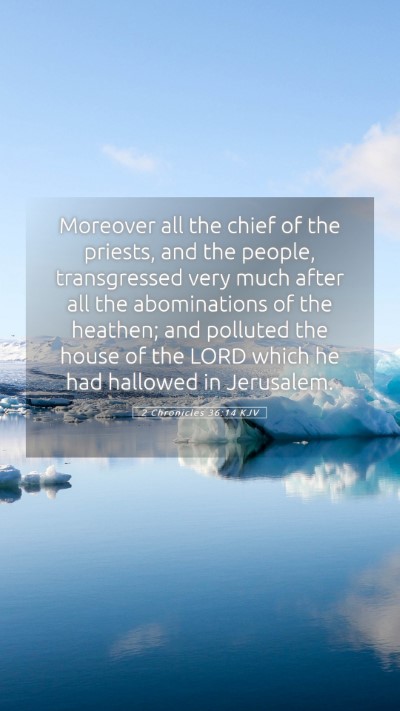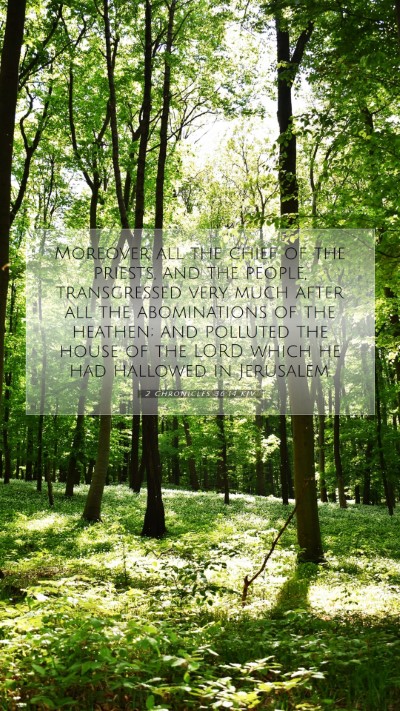Bible Verse Meaning: 2 Chronicles 36:14
Bible Verse: "Moreover all the chief of the priests, and the people, transgressed very much after all the abominations of the heathen; and polluted the house of the Lord which he had hallowed in Jerusalem."
Overview: In this verse, the chronicler documents the serious offenses committed by the leaders and people of Judah against God. They turned from their covenant obligations and embraced practices that were detestable to the Lord, leading to the desecration of the Temple.
Insights from Public Domain Commentaries
Matthew Henry's Commentary
Henry explains that this verse highlights a period of profound spiritual decline among the Jewish people, especially the spiritual leaders. Their actions not only show a blatant disobedience to God's commandments but also reveal the extent of corruption that permeated religious practices. Henry emphasizes that the forsaking of God's ways leads to dire consequences, and in this case, it resulted in God’s judgment coming upon His people.
Albert Barnes' Notes on the Bible
Barnes elaborates on the idea that the chief priests and the people represent authorities and followers who should uphold God's law. Their participation in pagan practices demonstrates a failure of leadership and a significant breach of the covenant with God. He stresses that the pollution of the Temple, the house of the Lord, illustrates the grave consequences of leading a community away from true worship and obedience to God.
Adam Clarke's Commentary
Clarke notes how the phrase "polluted the house of the Lord" indicates a deep-seated rebellion against God's holiness. He interprets this act of desecration as indicative of a broader societal failure to adhere to divine commandments. Clarke also connects this passage to the historic decline of Israel, underscoring that repeated disobedience leads to destruction and exile.
Interpretative Themes
- Spiritual Leadership: The leaders failed to lead the people in God's ways, resulting in spiritual corruption.
- Covenant Violation: The act of turning to abominations signifies a breaking of the covenant between God and His people.
- Consequences of Sin: The desecration of the Temple foreshadows the judgment and disaster that would befall the nation.
- God's Holiness: The emphasis on God's house being polluted pertains to the seriousness of maintaining holiness in worship.
Bible Study Insights
This verse serves as a poignant reminder for modern believers regarding the importance of maintaining spiritual integrity and rejecting worldly influences. In your Bible study groups or online Bible study sessions, it can prompt deep discussions on contemporary parallels where spiritual leaders may lead communities astray, and the responsibilities of believers to uphold holiness in their practices.
Application of the Verse
To apply the teachings of 2 Chronicles 36:14 in daily life, consider evaluating your own spiritual commitments and practices. Reflect on how external influences may lead you away from God's commandments and seek to renew your dedication to uphold His teachings as revealed in Scripture.
Cross References
- 2 Kings 24:3-4: Discusses the similar corruption and injustice that led to Judah's downfall.
- Jeremiah 7:30-31: The Lord's condemnation of the people's idolatry and the resulting desecration of His house.
- Ezekiel 8:5-18: A vision showing God’s awareness of the abominations happening within the Temple precincts.
- Isaiah 1:11-15: A strong critique of the people's worship that had become vain and hypocritical.
- Hosea 4:6: Highlights the consequences of a lack of knowledge and ignorance of God’s law.


